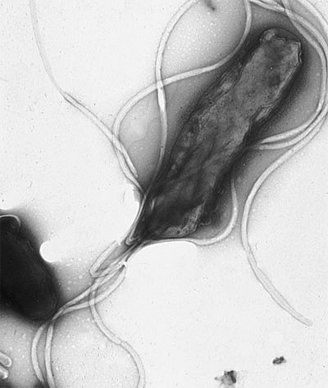Eradicating H pylori Could Help Prevent Gastric Cancer in Asians
Searching for and eradicating the bacteria Helicobacter pylori could reduce the incidence of gastric cancer in otherwise healthy individuals, especially in Asian populations, according to a new study.
Electron micrograph of H pylori possessing multiple flagella (negative staining); source: Yutaka Tsutsumi, MD, Wikimedia Commons

Searching for and eradicating the bacteria Helicobacter pylori could reduce the incidence of gastric cancer in otherwise healthy individuals, especially in Asian populations, according to a new study.
“Infection with Helicobacter pylori causes chronic gastritis, which can lead to gastric atrophy and intestinal metaplasia,” wrote study authors led by Alexander C. Ford, MD, of St. James University Hospital in Leeds in the United Kingdom. “These are the main histological precursors to gastric cancer, and it is therefore plausible that H pylori infection may cause gastric cancer.”
The authors conducted a meta-analysis of six individual randomized controlled trials, including a total of 3,294 individuals who received eradication therapy and 3,203 control subjects. Results were published on May 20 in the British Medical Journal.
The review found a total of 51 gastric cancers (1.6%) occurred in the H pylori eradication patients and 76 cancers (2.4%) in the control patients. This yielded a relative risk of 0.66 (95% CI, 0.46â0.95; P = .02), which was a significant effect.
The overall number needed to treat (NNT)-meaning the number of patients in which eradication of the bacterium would need to be performed in order to prevent one case of gastric cancer-was 124. This differed dramatically, however, based on specific populations. If the benefit from eradication is assumed to persist for one’s whole life, the NNT is 15.1 in Chinese men and 23.7 in Chinese women. In Japanese men the NNT is similar at 15.3, and 23 in Japanese women.
Because the overall lifetime risk of gastric cancer is much lower in American and British women, according to the studies used in this analysis, the NNT is much higher. For American men it is 163.4, and for American women it is 245.1. In the United Kingdom, the NNT is 94.9 for men and 163.4 for women.
The authors noted that none of several sensitivity analyses changed the statistical significance of the risk. Several of the studies included data on mortality as well as cancer incidence: there were 24 deaths (1.1%) from gastric cancer among 2,242 patients who underwent eradication therapy, compared with 36 deaths (1.6%) among the 2,233 control patients. This gave a relative risk that did not reach significance of 0.67 (95% CI, 0.40â1.11; P = .12). There was also no significant difference with regard to all-cause mortality.
The authors concluded that though this review provides “moderate” evidence that searching for and eradicating H pylori could provide benefit with regard to gastric cancer, that result should not be extrapolated outside of Asian populations. And though it seems likely that benefits of eradication will outweigh harms in well selected populations, they noted that “given that any programs based on such an intervention will involve healthy subjects, there needs to be a greater confidence in the estimate of effect and more information on any potential harms of H pylori eradication before such a strategy can be advocated as a means of preventing gastric cancer.”